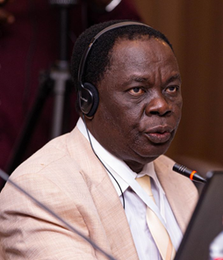The Fisheries Committee for the West Central Gulf of Guinea (FCWC), in cooperation with the government of Liberia under the aegis of its National Fisheries and Aquaculture Authority (NaFAA) is to host the sixteenth regional meeting of the FCWC West Africa Task Force (WATF) to end illegal fishing, from June12-14, 2024, in Monrovia to continue building cooperation in West Africa’s fisheries management.
The WATF was established in 2015 under the Fisheries Intelligence and MCS Support in West Africa project funded by the Norwegian Agency for Development Cooperation (Norad) and has operationalized key regional and international fisheries sector instruments to combat illegal, unreported and unregulated (IUU) fishing.
It has strengthened regional information-sharing and cooperation between countries; interagency collaboration at the national level; and facilitated region-wide enforcement actions triggered by intelligence analysis and intelligence-sharing, all while simultaneously building the FCWC region’s capacity to sustain these accomplishments.
The meeting is the first under the project’s Phase 3, which began at the year’s start.
This forthcoming biannual meeting will be the sixteenth gathering of fisheries directors and heads of monitoring, control, and surveillance (MCS) from FCWC’s Member States, with partners and fisheries experts, to share national-level updates and discuss regional-level actions to ensure that the FCWC WATF continues to function as the region’s lead mechanism for fisheries MCS.
With a strong focus on engagement with other African regions, representatives from the South Africa Development Community (SADC), the fisheries ministries of Sierra Leone and Cameroon, and the Sub-Regional Fisheries Commission (SRFC) will be attending the meeting.
FCWC Secretary-General Dr. Antoine Gaston Djihinto states “this meeting holds significance in several important ways. Firstly, the attendance of reps from our sister organizations and neighboring countries is a strong demonstration that the FCWC WATF partnerships, influence and collaborations are growing. Secondly, the renewal of the project for a third phase is an indication that our funding, institutional and implementation partners recognize the value that FCWC WATF has and the impact of the change it has delivered region-wide.
The new areas that the workplan is tackling verifies that although the region stands on its hard-won accomplishments, there remains more work to collectively tackle the challenges to our fisheries sector.”
The meeting is especially significant in the implementation of the project’s third phase, as it follows through on plans to sustain the FCWC’s establishment of a Regional MCS Centre (RMCSC), and the WATF’s creation of a regional online communications platform, linchpins of the region’s collaboration and cooperation in fisheries.
Key discussions for the three-day meeting include the staffing, initiatives and activities of the FCWC; the sustainability and operations of the RMCSC; and the updates on the regional transshipment strategy, ongoing initiatives and international instruments being implemented by Member States.
Executive Director of TMT, Duncan Copeland states “We’re very pleased to be back in Liberia for the 16th Task Force meeting. As we focus on the crucial discussions of broader African cooperation of IUU fishing and an updated transshipment Strategy, as well as moving forward on sustainability mechanisms for the RMCSC, we must also acknowledge the huge progress that the Task Force has made to date, and thank Norad for their long-term and continued support to the initiative.”
The other noteworthy observers of the meeting include representatives of the Economic Community of West African States (ECOWAS), United States MSAFE Africa, Skylight, Environmental Justice Foundation (EJF), Friends of the Nation Ghana (FoN Ghana), and Hen Mpoano.
The WATF brings together the six member countries of the Fisheries Committee for the West Central Gulf of Guinea (FCWC) – Benin, Côte d’Ivoire, Ghana, Liberia, Nigeria, and Togo – to tackle illegal fishing and stop the trade in illegally caught fish.
The Task Force is facilitated by the FCWC Secretariat and supported by a Technical Team that includes TMT and Stop Illegal Fishing (SIF) with funding from the Norwegian Cooperation Agency (Norad).
Through active cooperation, information sharing and facilitating the operations of national interagency working groups, the West Africa Task Force is working together to stop illegal fishing.


